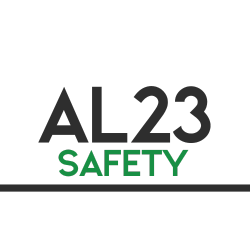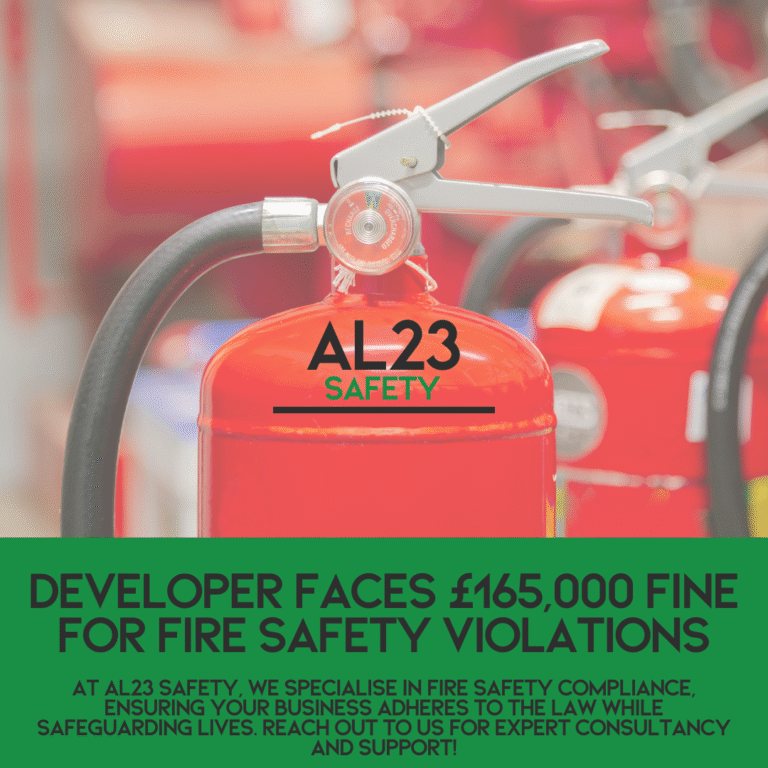Fire safety compliance is not just a legal obligation, it’s a lifeline that protects residents, workers, and the very future of construction projects. The stark consequences of neglecting fire safety regulations were laid bare in the case of Glovers Court Ltd, an Altrincham-based developer fined £165,000 for egregious safety lapses during a warehouse-to-flats conversion in Preston, Lancashire. This incident, coupled with the company’s subsequent liquidation, serves as a chilling reminder of the high stakes involved when fire safety compliance is ignored. At AL23 Safety, we specialise in guiding developers through the complexities of UK fire safety laws, ensuring projects are both compliant and secure.
The Glovers Court case, prosecuted in June 2025, exposed a catalogue of failures: no fire detection system, no means to raise alarms, and inadequate evacuation plans, as identified by Lancashire Fire and Rescue Service (LFRS). These shortcomings led to a prohibition notice, forcing residents to vacate their homes and highlighting a “blatant disregard” for the Regulatory Reform (Fire Safety) Order 2005, according to the Health and Safety Executive (HSE). Such oversights not only endanger lives but also incur devastating financial and reputational costs, with Glovers Court ordered to pay an additional £10,512 in costs on top of the fine.
In the UK, where construction fires account for hundreds of incidents annually, developers cannot afford to cut corners. AL23 Safety’s expert consultancy has helped numerous clients avoid similar fates, reducing fire risks by up to 40% through tailored strategies. In this blog post, we’ll unpack seven critical lessons from the Glovers Court case and broader fire safety compliance principles, offering actionable strategies to ensure your projects meet legal standards and prioritise safety.
The High Cost of Ignoring Fire Safety Compliance
The Glovers Court incident illustrates the catastrophic fallout of neglecting fire safety compliance. On 16 May 2023, LFRS visited the site and found no fire alarms, inadequate escape routes, and poor fire compartmentation, allowing potential fires to spread unchecked across six floors. The HSE’s subsequent investigation confirmed breaches of the Health and Safety at Work Act 1974 and Construction (Design and Management) Regulations 2015, leading to the £165,000 fine and liquidation of the company, which owed creditors over £1.7 million.
This case underscores that fire safety compliance isn’t optional, it’s a legal and moral imperative. The Fire Safety Order mandates that responsible persons, including developers, ensure premises are safe from fire risks. Failure to comply risks fines, project delays, and, most critically, loss of life. By contrast, proactive compliance can enhance project credibility, lower insurance costs, and foster trust among stakeholders. AL23 Safety’s interventions have saved clients from similar penalties, proving that prioritising fire safety compliance pays dividends.
7 Critical Lessons for Developers to Ensure Fire Safety Compliance
Drawing from the Glovers Court case and our expertise, here are seven vital lessons to strengthen fire safety compliance and protect your construction projects from disaster.
Lesson 1: Conduct Thorough Fire Risk Assessments for Fire Safety Compliance
The absence of a proper fire risk assessment was a key failing in the Glovers Court project. Comprehensive fire risk assessments identify hazards like flammable materials or faulty wiring, enabling proactive mitigation. AL23 Safety conducts detailed assessments aligned with the Fire Safety Order, helping clients eliminate risks early and avoid costly oversights.
Lesson 2: Install Robust Fire Detection Systems
Glovers Court’s lack of fire alarms was a glaring violation. Fire safety compliance requires reliable detection systems, such as smoke and heat alarms, to alert occupants promptly. Our consultants at AL23 Safety recommend and verify installation of compliant systems, ensuring early warnings that can save lives.
Lesson 3: Design Effective Evacuation Plans
Inadequate escape routes at Glovers Court forced residents to vacate. Fire safety compliance demands clear, accessible evacuation plans tailored to the building’s layout. We design bespoke plans, incorporating signage and drills, to ensure swift and orderly evacuations, as demonstrated by a client who reduced evacuation times by 25% after our intervention.
Lesson 4: Maintain Fire Compartmentation
The HSE noted Glovers Court’s failure to phase construction to maintain fire compartmentation, risking rapid fire spread. Fire safety compliance requires barriers to contain fires, especially in multi-storey projects. AL23 Safety audits construction phasing, ensuring compartmentation meets Building Regulations and prevents widespread damage.
Lesson 5: Engage Expert Fire Safety Consultants
The complexity of fire safety compliance demands professional expertise. Glovers Court’s oversights might have been avoided with specialist guidance. AL23 Safety provides end-to-end consultancy, from audits to strategy development, helping developers navigate regulations and implement best practices.
Lesson 6: Train Staff and Contractors on Fire Safety Compliance
Lack of training contributed to Glovers Court’s failures. Fire safety compliance includes equipping workers with knowledge of protocols and equipment use. Our tailored training programmes at AL23 Safety empower teams, reducing incident rates and fostering a safety-first culture.
Lesson 7: Monitor and Update Compliance Continuously
Glovers Court ignored prohibition and improvement notices, exacerbating their penalties. Ongoing monitoring is crucial for fire safety compliance, especially as projects evolve. AL23 Safety offers regular audits and updates, ensuring sustained adherence to regulations and preventing lapses.
The AL23 Safety Advantage in Fire Safety Compliance
At AL23 Safety, we transform fire safety compliance from a challenge into a competitive edge. Our certified consultants bring deep knowledge of UK fire regulations, offering bespoke solutions that address your project’s unique risks. From initial assessments to ongoing support, we ensure your developments meet HSE and LFRS standards, as evidenced by clients who’ve achieved zero fire incidents post-consultation.
The Glovers Court case is a sobering lesson: neglecting fire safety compliance can devastate lives and businesses. By adopting these seven lessons, developers can avoid such crises, protect occupants, and build sustainable projects. Don’t risk becoming the next cautionary tale, contact AL23 Safety today to discuss how our fire safety consultancy can secure your developments and elevate your safety standards.



